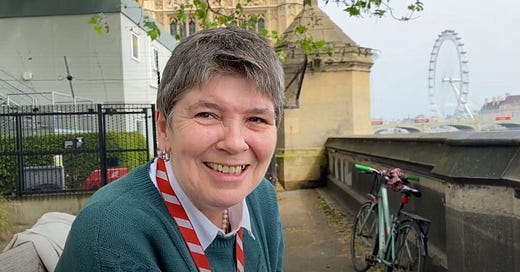Inside The Lords: harms, hecklers and hope for free speech
Claire Fox reports from a week inside the House of Lords, with democracy and free speech under attack.
Inside The Lords this week, I have been reminded why I will never feel ‘at home’ in the Palace of Westminster. I often find myself in a small minority arguing for more freedom, not less.
During a discussion about the dreaded Online Safety Bill, I had to remind my fellow Lords that equating words and violence - especially in relation to women and claims of misogyny - can have dangerous consequences. Indeed, we have seen some trans activists deciding to assault gender-critical women on the basis that their speech is so violent that it can be met in kind with physical violence.
At a different point in the debate, I found myself again at odds with fellow Lords - this time discussing the complaints procedures for how to report online harms. The government wants to set up a Super Complaints system in terms of Ofcom’s policing of sites run or hosted by Big Tech companies. But there is no procedure in the Bill for individuals or those with minority opinions to complain - something that, for once, all parties agreed the minister needed to address. Interestingly, however, my fellow peers assumed all the complaints would centre on content that hadn’t been removed or banned, whereas I was stressing the need to appeal when content is wrongfully removed or over-censored.
Many justify the Online Safety Bill because of toxic bullying and divisive abuse online. But the truth is that offline, certain topics can be just as nasty, and open to misinformation, name-calling and being silenced. One such topic is, of course, Brexit, so the debates about the Retained EU Law Bill this week were especially febrile.
Later, having endured what can only be described as a certain type of Remainiac contribution from a plethora of Lords on why ‘Brexit is the problem’, I made a rather cross intervention explaining that perhaps those most to blame for the present mess of untangling domestic law-making from EU regulations were those who spent years blocking a democratic vote (ie, many of my fellow unelected peers). Perhaps as an example of the febrile nature of politics, I was heckled by an elderly Labour Lord who wanted me to ‘shut up’. Unfortunately, the microphones didn’t pick up his unpleasantness, but did catch me repeating his words back to him. So, after much confusion and meetings with the Whips office, it had to be clarified that I had not shouted abuse at an ageing member of the House of Lords.
Funny how things can be misinterpreted - which is why I get so nervous about legislation that seeks to censor and criminalise ‘hate’ or ‘harms’. It seems like a lot of politics at the moment boils down to shouting matches. Which is why the work that the Academy of Ideas does is so important. Events like our annual Battle of Ideas festival encourage people to come together to argue and, most importantly, dig deeper into big, divisive issues. With that in mind, have you got your tickets? Early-bird rates will run out soon - so don’t delay.
Some more Online Safety Bill speeches from this week, and my concerns about a ‘Super Complaints’ system run by Ofcom. There is the potential for certain organisations' complaints to be taken more seriously than those from individuals. Others want an ombudsman - hmmm. More bureaucrats? NB most of those speaking assume complaints will be about Big Tech, not removing harmful content. My concern is, who do you complain to when your content is removed or censored?
Later, I asked for a quick clarification from the government about how the public and individuals might complain about problematic actions taken by Big Tech (which may well be brought about by this legislation).
How should Big Tech deal with the horrors of online encouragement of self-harm or suicide sites? Good question - but why is there no mention of social contagion of gender dysphoria and those who promote tools of self-harm (like chest binders or double mastectomies)?
My worry is that too many want the Online Safety Bill to be more censorious, to pick and choose what are harms and avoid the bigger issue of an offline social and cultural problem.
Another speech: the Online Safety Bill will effectively ensure that what is described as online misogyny will be conflated with physical violence. I argued this can’t be the case, however horrible the online speech is. Yes, lots of abuse is sexist. BUT there is a danger of an over-stated panic that treats women as inherently fragile, needing special protection, all while ignoring real anti-women threats coming from trans activists.
Applications are now open for Living Freedom Summer School 2023 which runs from 29 June to 1 July in central London.
The three-day residential school - run by the charity Ideas Matter - is open to anyone aged 18 to 30 regardless of whether you are based in the UK or beyond.
Attend to hear talks from experts on the history and philosophy of freedom, helping us to understand freedom of conscience and free will in the twenty-first century. With Progress now seen as dangerous, attendees and speakers will debate the implications for freedom, and explore innovations such as generative technologies and ChatGPT. There will plenty of opportunities to explore complex moral issues such as the case for reparations and the morality of borders, to revisit classic texts, and to debate contemporary hot topics, from sensitivity readers to the heckler’s veto.
Applications close at 9am on Monday 22 May.




